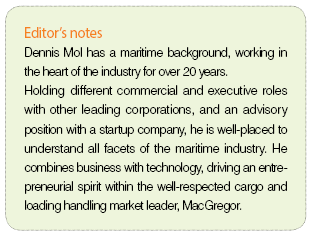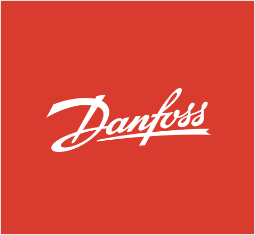ETC Pragmatism should drive the adoption of digital agendas
페이지 정보
작성자 최고관리자 댓글 0건 조회 4,577회 작성일 19-06-07 12:15본문

When seafarers were being lost as sea because of leaking wooden hatch covers, MacGregor solved the problem by inventing and manufacturing the industry’s first watertight steel hatch covers; lives were saved and cargo protected.
Almost a hundred years on, and whilst the hatch cover issue is essentially remedied, many more challenges remain. Currently none more so than the protracted depressed market conditions which are affecting shipowners’ commercial activities and very survival in economic terms.
These issues require practical solutions, much like the ‘see-it and solve-it’ approach to replacing unsafe wooden hatches that were a clear choice for operators a century ago. In the age of digital advances, are there equally obvious solutions for shipowners and operators to turn to now? MacGregor believes there is, and that similar significant advantages are available today through the value that digitally-enabled capabilities can offer. Their use is standard practice in other industries on mission-critical equipment, so why not in the maritime sector?
If there was a generation of operators that could really benefit from the commercial advantages of digitally-enabled equipment maintenance and the optimising of cargo space, it is this one. So one might consider why uptake is slow? Often when we talk about digitalisation, accelerated learning and intelligent solutions, it is part of a wider discussion dominated by theoretical-level or longer-term concepts, such as fully autonomous vessels, so realisable near-term advances sometimes become lost in the dialogue.
At MacGregor we are involved in visionary discussions, which are important and relevant. However, focusing on blue-sky thinking and talking about what digitalisation can do in the broadest terms only serves to drive a wedge between shipowners and operators and access to these near-term benefits, particularly in current market conditions.
Creating solutions customers need and understand
MacGregor is offering a pragmatic approach. We are ‘doers’ and well known for our engineering capabilities. We listen to customers, design equipment and whole solutions that meet the requirements of a specific ship and its operations. We can also do this in the digital arena, creating a solution that the customer needs, understands and will gain benefit from.
MacGregor has chosen to focus on a select few, commercially impactful digital solutions to bring to the market. Drifting a little away from visionary stories about where the market could go, and moving towards the provision of real services that have a tangible operational impact.
This gains credibility as our intelligent cargo handling applications translate into valuable, commercially viable solutions.
A population of experts
In line with an accelerated development approach, we completed our first ‘Google design sprint’ during March. These have a sophisticated methodology, where a maximum of seven people gather in one room to consider a specific problem, in our case a challenge that a customer is facing. The group comprises different MacGregor engineering and software specialists and customers, all working together; so a population of experts. They participate in a disciplined, time-based process over a week from Monday morning until Friday afternoon. The objective is to experiment at speed and with a very high focus on taking the initial idea to a customer valuable concept and digital mockup.
We have simulation software that our engineers use to pre-design and analyse how, for example, an offshore crane works in reality. A Google design sprint includes thinking about how such a digital simulation platform can help to prepare for and advise real-time operations, with higher efficiency and increased operational windows within its safety margins.
We are asking customers to join us because we believe that with more enriched information, especially weather data, currents and wave heights, the simulation platform will be able to deliver much greater prediction and safeguarding accuracy.
Our objective is to reach a point where we can confidently advise a customer that a crane could operate for half an hour longer than would have been previously possible, because more relevant data will help to mitigate against taking a more conservative approach.
So, in this sense, we have the underlying technology, but you might call it a rough diamond. Polishing it with enriched data delivers a solution that helps customers earn more money from their ships.
Moving from a conceptual remit
Our approach is breaking down traditional barriers, and our experience is that customers are willing to share information that may have previously been considered as commercially sensitive. We are demonstrating our intention to be practical and share our knowledge, moving our digital advances out of a conceptual remit.
The idea that companies must disrupt or be disrupted to survive has relevance for us all. If we are not thinking along the lines of a tangible digital agenda, you can be sure that others will be. These companies are smart and agile and we are alert to their capabilities, but what they do not have is our extensive operational knowledge.
Our cargo and load handling experience is second to none. A newcomer cannot really develop a valuable application until it fully understands the market and operating environment. MacGregor has a very strong position and we are able to translate our operational and technical knowledge into valuable, new solutions.
Having said this, we are also open across all of our digital developments to collaborating with start-up companies, particularly in the areas of geospatial weather analytics, the use of on-board devices to support capacity optimisation and the ability to analyse offshore crane data. These capabilities can provide actionable insights and help accelerate the development of new services for our customers.
We are not promising the world because we know how difficult it is to deliver that, but we are ambitious for our customers and ourselves. We are taking encouraging cases, working closely with customers and learning from each other to deliver commercial value.
MacGregor also benefits from being part of the Cargotec family, a company committed to being the leader in intelligent cargo and load handling, which provides the financial capability to invest in new technologies and take full advantage of the Group’s capabilities.
Four focus areas
When it comes to digitalisation, MacGregor is focused on helping customers to enhance their operations either through earning more money on the ship, or to build and operate more efficiently and with lower costs.
Our digital agenda is concentrated in four specific areas; predict, safeguard, optimise and automate. These are ‘category’ words referring to the potential value we can create by applying or deploying digital technologies.
To explain this further, our ‘predict’ category includes elements such as enhanced maintenance capabilities. Here, for example, we can use our knowledge to develop algorithms that can predict when certain equipment requires maintenance, based on use and condition rather than conventional ‘time based’ service schedules.
The offshore crane and associated Google design sprint work referred to earlier is a relevant example within the ‘safeguard’ and ‘optimise’ categories.
MacGregor’s proven Cargo Boost service is included within the ‘optimise’ category. Over the past three years, more than 100 containership optimisation upgrades have been completed for highly reputable owners and the benefits demonstrated in service.
Applying this knowledge, we have started a development programme to tailor our optimisation algorithms for breakbulk ships focused on increasing capacity utilisation and accelerating the stowage process. The next application will be to help RoRo customers remove discharging process flaws onshore and optimise offloading operations.
The fourth category is ‘automate’. Good examples of activities in this area are our autonomous offloading crane technology and automated mooring systems, the latter currently under development, which apply technological advances from a robotics domain.
Scalable solutions, available to many
The MacGregor digital agenda is valid for one vessel or an entire fleet. The kernel of a solution must be as widely applicable as we can make it so that it is scalable and of benefit to the many, not the few. There will always be a degree of customisation required but, by minimising this, we are able to offer cost-efficient solutions to shipowners, operators and shipbuilders today. 
- 이전글With a Wide Local and Regional Shipping Industry Participation 19.06.07
- 다음글삼성重, 친환경 LNG 연료추진선 첫 출항 성공 19.06.07












